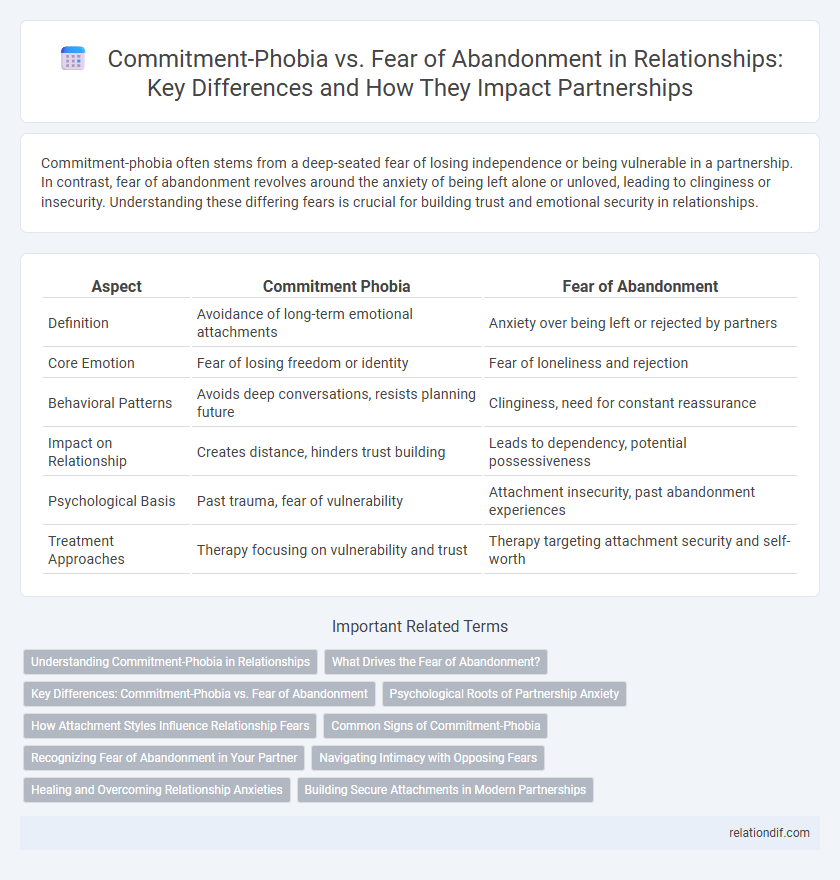Commitment-phobia often stems from a deep-seated fear of losing independence or being vulnerable in a partnership. In contrast, fear of abandonment revolves around the anxiety of being left alone or unloved, leading to clinginess or insecurity. Understanding these differing fears is crucial for building trust and emotional security in relationships.
Table of Comparison
| Aspect | Commitment Phobia | Fear of Abandonment |
|---|---|---|
| Definition | Avoidance of long-term emotional attachments | Anxiety over being left or rejected by partners |
| Core Emotion | Fear of losing freedom or identity | Fear of loneliness and rejection |
| Behavioral Patterns | Avoids deep conversations, resists planning future | Clinginess, need for constant reassurance |
| Impact on Relationship | Creates distance, hinders trust building | Leads to dependency, potential possessiveness |
| Psychological Basis | Past trauma, fear of vulnerability | Attachment insecurity, past abandonment experiences |
| Treatment Approaches | Therapy focusing on vulnerability and trust | Therapy targeting attachment security and self-worth |
Understanding Commitment-Phobia in Relationships
Commitment-phobia in relationships stems from an intense fear of losing personal freedom or making irreversible decisions, often leading to avoidance of deep emotional bonds. This differs from fear of abandonment, where individuals desperately seek reassurance and fear being left alone. Understanding these distinctions is crucial for addressing communication barriers and fostering healthier partnership dynamics.
What Drives the Fear of Abandonment?
The fear of abandonment is primarily driven by past experiences of loss, neglect, or inconsistent caregiving, which create deep-seated insecurities and anxiety about being left alone. This emotional vulnerability often leads to hypervigilance in relationships, where individuals constantly seek reassurance to avoid perceived rejection. Unlike commitment-phobia, which stems from a reluctance to be tied down, the fear of abandonment centers on intense emotional dependency and the dread of losing close connections.
Key Differences: Commitment-Phobia vs. Fear of Abandonment
Commitment-phobia involves an avoidance of long-term emotional bonds due to fear of losing freedom or facing vulnerability, often manifesting as distancing behaviors in relationships. Fear of abandonment centers on anxiety about being left or rejected, leading to clinginess and insecurity to prevent perceived or real separation. Key differences lie in the root motivations--commitment-phobia seeks to evade intimacy, while fear of abandonment stems from a deep need for reassurance and connection.
Psychological Roots of Partnership Anxiety
Commitment-phobia in partnerships often stems from deep-seated fears of losing independence or repeating past relational failures, while fear of abandonment arises from childhood neglect or inconsistent caregiving, leading to anxiety about being left alone. These psychological roots trigger defensive behaviors that complicate trust and intimacy within partnerships. Understanding these underlying fears is crucial for addressing partnership anxiety and fostering healthier, more secure connections.
How Attachment Styles Influence Relationship Fears
Attachment styles significantly shape how individuals experience commitment-phobia or fear of abandonment, with anxious attachment often driving fears of being left, while avoidant attachment fuels reluctance to commit. Those with anxious attachment may exhibit clinginess and heightened sensitivity to relational cues, intensifying fear of abandonment. Secure attachment promotes healthier relationship dynamics by fostering trust and reducing both commitment-phobia and abandonment fears.
Common Signs of Commitment-Phobia
Common signs of commitment-phobia include an avoidance of long-term plans, discomfort with emotional intimacy, and frequent changes in relationship status. Individuals exhibiting commitment-phobia often display reluctance to label relationships or discuss future goals. This behavior contrasts with fear of abandonment, which typically involves anxiety over partner loss rather than avoidance of commitment itself.
Recognizing Fear of Abandonment in Your Partner
Recognizing fear of abandonment in your partner involves identifying behaviors such as excessive need for reassurance, clinginess, or sudden withdrawal during conflicts. This fear often stems from past traumas or insecure attachment styles, influencing how partners react to intimacy and trust. Understanding these signs allows you to approach the relationship with empathy and develop strategies that foster security and mutual commitment.
Navigating Intimacy with Opposing Fears
Navigating intimacy in partnerships requires understanding the nuanced differences between commitment-phobia and fear of abandonment, as these opposing fears fundamentally shape relational dynamics. Commitment-phobia often stems from a desire to maintain independence and avoid vulnerability, while fear of abandonment triggers anxiety over losing connection and being left alone. Effective communication and empathetic support provide crucial pathways for partners to bridge these fears and foster secure, lasting bonds.
Healing and Overcoming Relationship Anxieties
Healing relationship anxieties involves recognizing the difference between commitment-phobia--a fear of losing personal freedom--and fear of abandonment, which stems from worries about being left alone. Overcoming these challenges requires developing secure attachment through open communication, emotional validation, and gradual trust-building exercises. Therapeutic approaches such as cognitive-behavioral therapy (CBT) and mindfulness techniques effectively reduce anxiety and foster deeper intimacy in partnerships.
Building Secure Attachments in Modern Partnerships
Building secure attachments in modern partnerships requires addressing commitment-phobia and fear of abandonment as distinct yet interconnected challenges. Commitment-phobia often stems from anxiety about losing independence, while fear of abandonment arises from past relational traumas and insecurity. Cultivating open communication, trust, and emotional vulnerability fosters resilience and a safe relational environment, essential for overcoming these attachment barriers and sustaining healthy partnerships.
commitment-phobia vs fear of abandonment Infographic

 relationdif.com
relationdif.com